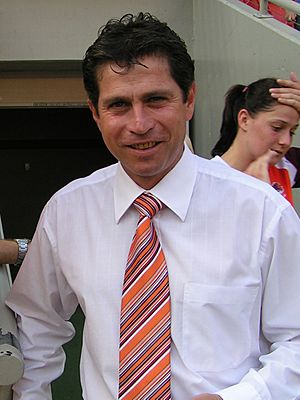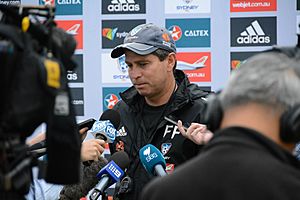Frank Farina facts for kids
 |
||||||||||||||||||||||||||||
| Personal information | ||||||||||||||||||||||||||||
|---|---|---|---|---|---|---|---|---|---|---|---|---|---|---|---|---|---|---|---|---|---|---|---|---|---|---|---|---|
| Date of birth | 5 September 1964 | |||||||||||||||||||||||||||
| Place of birth | Darwin, Australia | |||||||||||||||||||||||||||
| Height | 1.77 m (5 ft 10 in) | |||||||||||||||||||||||||||
| Position(s) | Striker | |||||||||||||||||||||||||||
| Youth career | ||||||||||||||||||||||||||||
| Stratford United | ||||||||||||||||||||||||||||
| Edge Hill United | ||||||||||||||||||||||||||||
| 1982–1985 | AIS | |||||||||||||||||||||||||||
| Senior career* | ||||||||||||||||||||||||||||
| Years | Team | Apps | (Gls) | |||||||||||||||||||||||||
| 1981 | Mareeba United | 4 | (0) | |||||||||||||||||||||||||
| 1983–1984 | Canberra City | 41 | (15) | |||||||||||||||||||||||||
| 1985–1986 | Sydney City | 43 | (21) | |||||||||||||||||||||||||
| 1987–1988 | Marconi Stallions | 47 | (33) | |||||||||||||||||||||||||
| 1988–1991 | Club Brugge | 75 | (43) | |||||||||||||||||||||||||
| 1991–1992 | Bari | 8 | (0) | |||||||||||||||||||||||||
| 1992 | → Notts County (loan) | 3 | (0) | |||||||||||||||||||||||||
| 1992–1994 | Strasbourg | 47 | (14) | |||||||||||||||||||||||||
| 1994–1995 | Lille | 27 | (6) | |||||||||||||||||||||||||
| 1995–1998 | Brisbane Strikers | 63 | (33) | |||||||||||||||||||||||||
| 1998–1999 | Marconi Stallions | 2 | (0) | |||||||||||||||||||||||||
| Total | 336 | (145) | ||||||||||||||||||||||||||
| International career | ||||||||||||||||||||||||||||
| 1982–1983 | Australia U20 | 8 | (3) | |||||||||||||||||||||||||
| 1984 | Australia U23 | 5 | (1) | |||||||||||||||||||||||||
| 1985 | Australia B | 2 | (0) | |||||||||||||||||||||||||
| 1984–1995 | Australia | 37 | (11) | |||||||||||||||||||||||||
| Managerial career | ||||||||||||||||||||||||||||
| 1996–1998 | Brisbane Strikers | |||||||||||||||||||||||||||
| 1998–1999 | Marconi Stallions | |||||||||||||||||||||||||||
| 1998–2005 | Australia | |||||||||||||||||||||||||||
| 2006–2009 | Brisbane Roar | |||||||||||||||||||||||||||
| 2011–2013 | Papua New Guinea | |||||||||||||||||||||||||||
| 2012–2014 | Sydney FC | |||||||||||||||||||||||||||
| 2015 | Fiji U20 | |||||||||||||||||||||||||||
| 2015–2016 | Fiji | |||||||||||||||||||||||||||
| 2016 | Fiji U23 | |||||||||||||||||||||||||||
| 2021–2022 | Wynnum District | |||||||||||||||||||||||||||
|
Medal record
|
||||||||||||||||||||||||||||
| *Club domestic league appearances and goals | ||||||||||||||||||||||||||||
Frank Farina is a famous Australian football (soccer) coach and former player. He was born on September 5, 1964. Frank played as a forward, which means he was usually trying to score goals.
His playing career took him all over the world, including Australia, Belgium, France, Italy, and England. He was a very important player for the Australian national team, the Socceroos, in the late 1980s and 1990s. Later, he also became the coach of the national team in the early 2000s. Frank Farina was the first Indigenous Australian to manage the national football team. As of November 2021, he is part of the National Indigenous Advisory Group for Football Australia.
Contents
Frank Farina's Playing Career
Frank Farina was born in Darwin, Australia. He spent some of his childhood in Papua New Guinea. He grew up in Cairns, where he played youth soccer for teams like Stratford United. In 1982, he earned a special scholarship to the Australian Institute of Sport. The next year, he played in the National Soccer League for the Canberra Arrows.
Early Days in Australia
When Frank was 16, he played his first paid soccer games for Mareeba United in the Queensland State League. He played four games that season.
Frank spent his early career playing in Australia's National Soccer League. He played for the Canberra Arrows, Sydney City, and Marconi-Fairfield. He scored almost ten goals each season for Canberra in 1983 and 1984. In 1984, he won the Most Entertaining Player award from SBS-TV.
Frank made his first international appearance for Australia in 1984. He joined Sydney City in 1985. That year, Sydney City reached the 1985 NSL Grand Final. They also won the 1986 National Cup.
After Sydney City stopped playing in 1987, Frank moved to Marconi Fairfield. He played there in 1987 and 1988. He scored many goals, 16 and 17 in those two years. He won the Golden Boot Award and the Players' Player Medal both years. In 1988, he also won the Oceania Player of the Year award. His great performance caught the attention of teams overseas.
Playing in Europe
In 1988, Frank moved to Belgium to play for Club Brugge. He was known for his excellent goal-scoring. He played over 70 games for Brugge and scored 43 goals. He helped the club win the Belgian First Division title in 1989-90. They also won the Belgian Cup in 1990-91 and the Belgian Supercup in 1990 and 1991. Frank won the Belgian Golden Boot and Best Foreign Player awards in 1989-90.
In 1991-92, Frank moved to Bari in Italy. He was the first Australian to play in Serie A, which is Italy's top football league. This was a record transfer fee for an Australian player at the time. He later had a short loan period at Notts County in England.
Then, Frank moved to Strasbourg in France in 1992-93. He had two good seasons there, scoring goals in the French First Division. His last season in Europe was for Lille, where he also scored six goals.
Frank Farina's Coaching Career
Coaching the Brisbane Strikers
Frank returned to Australia in 1995 to play for the Brisbane Strikers. He scored 20 goals in 20 matches in his first season back. In 1996-97, Frank became the player-coach for the Strikers.
He led the Brisbane Strikers to their first-ever NSL title that year. They beat Sydney United 2-0 in the Grand Final. Frank scored the first goal in that important match. He was named the Coach of the Year in 1997. After this, he played less due to injury and age. He then joined Marconi as a player-coach for one final season before retiring from playing.
Coaching the Australian National Team
In 1999, Frank Farina was chosen to be the coach of the Australian National Team, the Socceroos. This made him the first Indigenous Australian to lead the team. His first win as coach was in February 2000, when Australia beat Hungary 3-0.
Winning the OFC Nations Cup
In 2000, Australia played in and won the Oceania Nations Cup. This win meant they qualified for the 2001 FIFA Confederations Cup.
Success at the FIFA Confederations Cup
Australia did very well at the 2001 Confederations Cup. They finished second in their group, thanks to a memorable 1-0 win against the world champions, France. They then won the third-place playoff against Brazil with the same score.
World Cup Qualifiers
In 2001, Australia started trying to qualify for the World Cup again. Frank led the team to huge wins, including a record-breaking 31-0 victory against American Samoa. In that game, Archie Thompson scored 13 goals, setting a new record for most goals in a single international match.
Australia won their group and then beat New Zealand to qualify for a World Cup Playoff against Uruguay. Despite their strong performances, Australia lost to Uruguay and did not qualify for the 2002 World Cup.
Later Years as National Coach
In 2002, Australia sent a team of local players to the Oceanian Nations Cup. They reached the final but lost to New Zealand. In 2003, Australia had a notable 3-1 win against England in a friendly game. In 2004, Australia easily moved through the World Cup Oceania qualifiers.
Frank's time as national coach ended in 2005. He left by "mutual consent" after the team lost all three games at the 2005 Confederations Cup. He was replaced by Guus Hiddink, who successfully led Australia to qualify for the 2006 FIFA World Cup.
Coaching Brisbane Roar and Other Teams
In November 2006, Frank Farina became the head coach of Brisbane Roar. He was known for supporting young Australian players. He helped bring in players like Michael Zullo and Tahj Minniecon. He left the club in October 2009.

In February 2011, Frank signed a contract to coach the Papua New Guinea team. In November 2012, he was appointed head coach of Sydney FC. He coached Sydney FC until April 2014.
After leaving Sydney FC, Frank became a technical adviser for the Fiji U-20s. In January 2015, he took over as the full coach for the U-20s. In October 2015, he also became the head coach of the Fiji senior team. He coached both teams until 2016.
Other Roles and Personal Life
In November 2021, Frank Farina joined the first National Indigenous Advisory Group for Football Australia. This group works to help more Indigenous people get involved in football.
Frank Farina has Italian and Torres Strait Islander heritage. He is married and has two children. His son, Jordan Farina, also plays football. In 1998, Frank published his autobiography, My World Is Round: A Personal Playing History. In 2000, he received the Medal of the Order of Australia for his contributions to soccer as a player and coach.
There is a football trophy named after him, the Frank Farina Cup. It is played between two teams from North Queensland, where Frank grew up.
Honours and Achievements
As a Player
- Belgian League Championship: 1989–1990
- Belgian Cup: 1990–1991
- Belgian Supercup: 1990, 1991
- Brisbane Strikers
- NSL Championship: 1996–1997
- Marconi Fairfield
- NSL Championship: 1988
- Sydney City
- NSL Cup: 1986
- Personal Awards
- FFA Hall of Champions Inductee – 2001
- Oceania Footballer of the Year: 1988
- Belgian League Top Scorer: 1989–1990
- NSL Player of the Year: 1987, 1988 (with Marconi Fairfield)
- NSL Top Scorer: 1987 (16 goals), 1988 (16 goals) (with Marconi Fairfield)
As a Manager
- OFC Nations Cup: 2000, 2004
- Brisbane Strikers
- NSL Championship: 1996–1997
Managerial Statistics
| Team | From | To | Record | ||||
|---|---|---|---|---|---|---|---|
| Games | Wins | Draws | Losses | Win % | |||
| Brisbane Roar | 16 November 2006 | 14 October 2009 | 66 | 28 | 18 | 20 | 42.42 |
| Papua New Guinea | 12 February 2011 | 15 November 2012 | 7 | 2 | 2 | 3 | 28.57 |
| Sydney FC | 28 November 2012 | 23 April 2014 | 47 | 19 | 8 | 20 | 40.43 |
| Total | 120 | 49 | 28 | 43 | 40.83 | ||
Images for kids
See also
 In Spanish: Frank Farina para niños
In Spanish: Frank Farina para niños
 | Madam C. J. Walker |
 | Janet Emerson Bashen |
 | Annie Turnbo Malone |
 | Maggie L. Walker |


